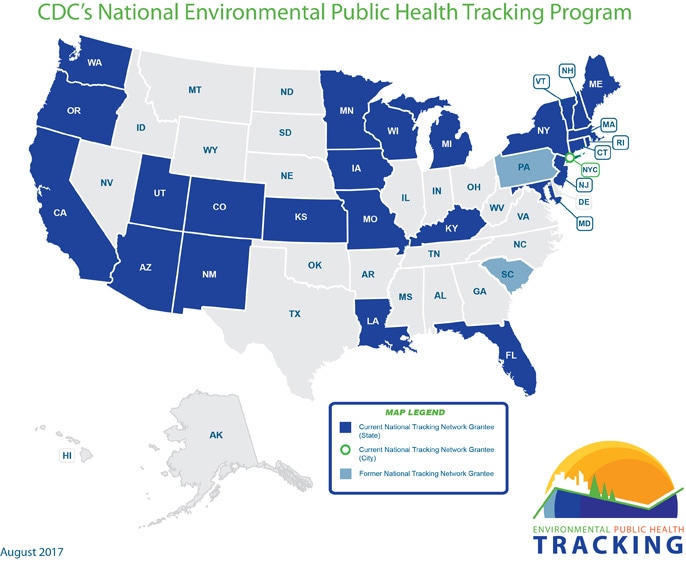The National EPHT Program
- CDC Tracking Grantee Map
-
 Click the map for a larger view.
Click the map for a larger view.
In 2000, the Pew Environmental Health Commission published a report demonstrating an "environmental health gap" - a lack of basic information needed to link environmental hazards and chronic diseases - exists in the United States and called for a nationwide system to track and combat environmental health threats. Beginning in 2002, the Centers for Disease Control and Prevention (CDC) began the process to develop this national tracking system by seeking proposals for funding cooperative agreements with state and local health departments, including the Massachusetts Department of Public Health/Bureau of Climate and Environmental Health (MDPH/BCEH). A map of state and local program grantees is below. Information about partners in the National EPHT Program is available.
Environmental Public Health Tracking (EPHT) is the ongoing collection, integration, analysis, and interpretation of data about:
- Environmental hazards (e.g., air pollutants)
- Exposure to environmental hazards (e.g., childhood blood lead levels)
- Health effects potentially related to exposure (e.g., asthma, cancer)
As part of this effort, the CDC worked with the state/local and academic partners to develop a set of nationally consistent environmental and health measures that are reported on the National EPHT Program website.
Environmental and health measures available on the national CDC portal have been developed for the following national indicators:
Health Indicators
- Asthma
- Birth Defects
- Cancer
- Carbon Monoxide Poisoning
- Childhood Lead Poisoning
- Chronic Obstructive Pulmonary Disorder (COPD)
- Heart Attacks
- Heat Stress
- Reproductive Health Outcomes
Environmental Indicators
- Air Quality
- Drinking Water Quality
The national website is available at the following address: http://www.cdc.gov/nceh/tracking/
